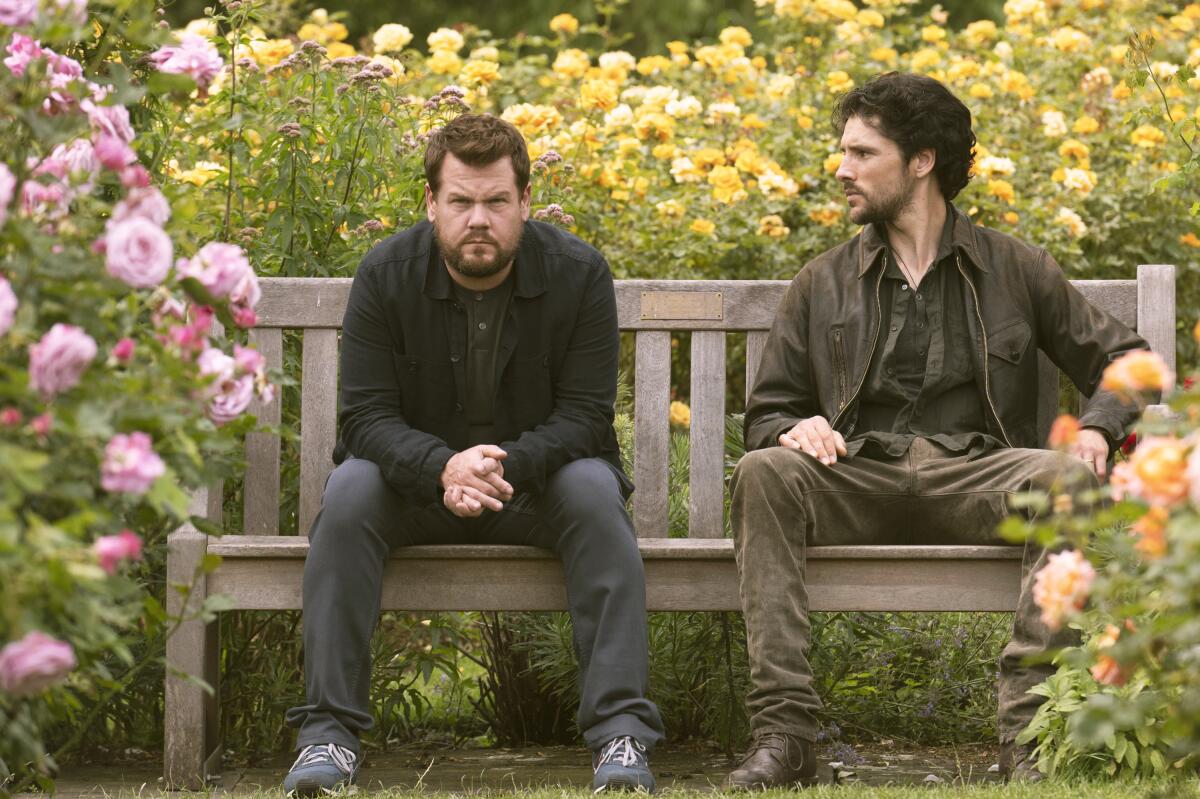In his frustrating new TV show, James Corden plays a man it’s hard to root for

- Share via
In “Mammals,” premiering Friday on Prime Video, James Corden plays Jamie, a London chef on the verge of opening his own restaurant. He is married to Amandine (Melia Kreiling), who is French and works in market research, a job that exists here, for the space of a single scene, only to demonstrate that it is not interesting. (It is not beside the point that she is also extremely beautiful, where Jamie is James Corden.) Jamie’s best friend Jeff (Colin Morgan) is also his brother-in-law, married to his sister Lue (Sally Hawkins). Jeff is an academic, specializing in veterinary neurobiology; Lue works in a second-hand store. They live in a nice place in the country with goats out back and a giant stag in the vicinity. There are children, who are either heard of but not seen, or are used to advance a plot point.
(The topical irony of Corden, recently in the news for being rude to the staff at a New York restaurant, playing a chef, is hereby duly noted.)
As the six-part series begins — parceled out like a comedy, which it sort of is, in 30-minute episodes — Jamie and Amandine are spending a celebratory holiday in a rented cottage overlooking the ocean. On the way there, despite the fact that Amandine is pregnant, Jamie encourages her to drive fast for fun on a winding cliffside road. This struck me as a strange way for an expectant father to act, and doesn’t really align with what we’ll come to know of him, but it is not the last instance of unaccountable behavior over the next three hours.
The morning after their arrival, these things happen in extremely short order: Jamie spots a whale breaching out at sea. (Whales recur symbolically throughout the series.) He sees Tom Jones (the Tom Jones, as the Tom Jones) in front of a neighboring cottage. And Amandine miscarries. Soon after, using her phone to notify family and friends, he discovers a series of sexts, and we are off on an investigation into love, fidelity and jealousy as, in lieu of having a discussion, Jamie turns detective, enlisting Jeff’s help. Without going into detail, the more he learns, the less he likes it, but he keeps going.
‘When you make a mistake, you’ve got to take responsibility,’ James Corden said of his behavior at the New York restaurant Balthazar.
As to Lue, she is slipping into a state of distraction, which, once she falls upon a biography of Coco Chanel, gives way to scenes in which she imagines herself a designer in 1920s Paris. Her interactions with the other main characters are comparatively brief, and Jeff is often away. (They are sad, for obscure reasons — because they’re married? I don’t know.) A scene in which he lectures on “social and sexual affiliation in prairie voles” (“Of the roughly 5,000 species of mammals, only 3 to 5% are known to form lifelong pair bonds”) borrows a note from Alain Resnais’ “Mon oncle d’Amerique,” in which philosopher and neurobiologist Henri Laborit discusses animal behavior to underscore stories of people behaving like animals.
The title, of course, is a fairly blunt headlining of the same idea. There’s also an ongoing opposition of the scientific and the spiritual, and the question of when a surfacing whale is just a mammal coming up to breathe and when it is the universe calling.
“If love is impossible, we must believe in the impossible,” Jamie and Amandine declare in a “manifesto” early in their relationship. “We must believe in magic.”
“Mammals” was written by Jez Butterworth, best known and very highly regarded as a playwright. His “The Ferryman” won the Tony for best play in 2019; “Jerusalem,” which British critics embraced as one of the greatest plays of the century, and possibly ever, was nominated in that category in 2011. (He also co-wrote the Bond film “Spectre” and the upcoming fifth “Indiana Jones” film.) As a TV show, however, it is uncomfortably like a play, with episodes of speechifying and dialogue that sound more constructed than natural. It’s the sort of drama in which a character can say, of a certain event, “That was seven years, three weeks and one day ago,” without having been established as a Marilu Henner-type savant — although, as Amandine also sees the anagram of a telling phrase in a board full of Scrabble tiles, perhaps we are meant to regard her as some kind of genius or wizard.
A roundup of a mess of British shows being imported to American television this month, and thoughts on the trend in a time of reduced production, and of peak American interest in U.K. TV.
There is also the common theatrical device of the late last-act revelation that turns everything on its head, giving new context to what we’ve seen. It’s ingenious, and worth a gasp — there are a few other gasp-worthy moments along the way — but by the time it arrived, I had grown so frustrated with Jamie, who has a talent for making his life worse, that I didn’t really care how things would work out for him. As to the others, I was hardly invested in their stories — they felt almost beside the point, including Amandine’s. (Everyone gets some screen time, but Jamie sucks up most of the dramatic air.) People are complicated, but, meaning no disrespect to the actors, these people don’t seem complicated so much as incompletely drawn.
One can imagine some version of this working just fine on the stage — and “Jerusalem” is longer than the whole of “Mammals” — but as television it wears a patina of inauthenticity. (Not unusual for television, it’s true.) This was not a problem with the crazy, declamatory, semi-supernatural “Britannia” — which Butterworth co-created with brother Tom Butterworth and James Richardson, also a co-creator here — with its Roman general, Celtic queen and Druid priest. But it works less well for the more or less ordinary folk of modern London.
I don’t expect every viewer to be equally sensitive to these tonal niceties, and I’m sure many will find the series, directed by Stephanie Laing, compelling. Presented in cinematic widescreen, it is fundamentally an intelligent, adult entertainment, not without ideas. (Indeed, ideas seem to precede character.) It has a beguiling soundtrack made of French pop songs and a score that echoes Django Reinhardt and Stephane Grappelli and keeps the mood light, as if to remind us that this is at least half a comedy. And, for an instant, it has Tom Jones, who is very good.
‘Mammals’
Where: Prime Video
When: Anytime, starting Friday
Rated: 16+ (may be unsuitable for children under the age of 16 with an advisory for violence)
More to Read
The complete guide to home viewing
Get Screen Gab for everything about the TV shows and streaming movies everyone’s talking about.
You may occasionally receive promotional content from the Los Angeles Times.








